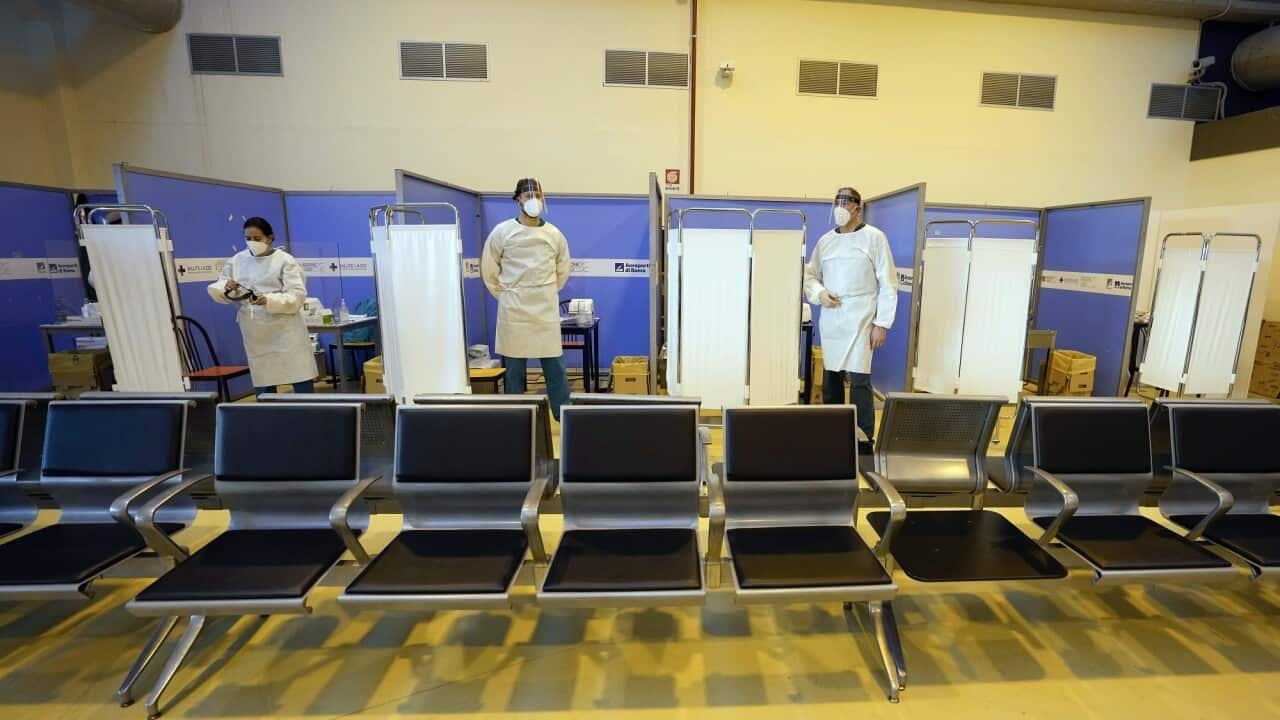KEY POINTS
- Travellers from China will need to show proof of a negative COVID-19 test before boarding a flight to Australia.
- The temporary measures will come into force from 5 January.
- People coming from Hong Kong and Macau will be included in the mandatory testing.
Australia will impose mandatory COVID-19 testing for travellers arriving from China as cases rise in the key tourism and business market.
Health Minister Mark Butler says travellers in China will need to take a COVID test within 48 hours before travel and show evidence of a negative result before coming to Australia, starting from 5 January.
He cited the "lack of comprehensive information" from Beijing to the international community about the outbreak gripping the nation of 1.4 billion people.
"The decision to implement these temporary measures has been made out of an abundance of caution, taking into account the dynamic and evolving situation in China and the potential for new variants to emerge in an environment of high transmission," Mr Butler said in Adelaide on Sunday.
The mandatory testing will apply to travellers from Hong Kong and Macau - in addition to mainland China.
He said the government had shared its decision with Chinese authorities on Sunday, but were yet to receive a response.
Mr Butler said the resumption of travel between the two countries was "really important" for economic activity, particularly in the tourism and education sectors.
"These arrangements have not been put in place lightly," Mr Butler said.
What other virus detection measures are being considered?
Mr Butler said the government would provide further detail on the type of test passengers would need to take, but it was important to ensure they were "robust and verifiable".
"The Australian government shares the concerns that have been expressed over recent days by a number of other governments and importantly by the World Health Organisation," he said.
"The World Health Organisation has described such measures as understandable."
The health minister said advice provided by the nation's chief medical officers deemed travel between the two countries posed no immediate public health threat to Australia, which was well placed to manage the pandemic.
He said the Omicron variant BF.7, which is behind the wave of infections in China, had been present in Australia as early as mid-2021.
Mr Butler said the government also intended to explore the feasibility of testing the wastewater from aircraft, in addition to widespread community wastewater testing to bolster Australia's detection capacity.
What has been the reaction from the federal opposition, universities?
Opposition health spokeswoman Anne Ruston criticised the government for not having released the health advice.
"The opposition strongly supports any measures that protects the lives and livelihoods of Australians," she said.
"The opposition will seek a briefing from the chief medical officer on this decision but the Labor government must be transparent with the public, and release the health modelling and advice."
Australia would also strengthen its tracing of people who test positive within 14 days of arriving from overseas.
Universities Australia chief executive Catriona Jackson described the decision as a "sensible measure".
"Importantly, this decision does not close the door to Chinese students returning to Australia to start or continue their university studies," she said.
How is China's Xi Jinping seeking to reassure residents amid rising cases?
Australia has now joined Canada, the US, France, India, Japan, Malaysia, Spain, South Korea and several European nations in introducing similar measures.
Authorities have cited a lack of data on infections in China amid concerns that new variants may spread.
In his first public comments since China lifted the last restrictions on air travel, President Xi Jinping called for more effort and unity as China enters a "new phase".
"Epidemic prevention and control is entering a new phase... Everyone is working resolutely, and the light of hope is right in front of us," Mr Xi said in his televised New Year's address.
LISTEN TO

China prepares to open its borders next month
SBS News
28/12/202203:51
China on Saturday reported more than 7,000 new infections and one death linked to COVID out of its population of 1.4 billion - but the figures appear to be out of step with the reality on the ground.
Chinese hospitals have since been hit by a flood of mostly elderly patients, crematoriums have been overloaded and many pharmacies have run out of fever medications.
The accumulated official death toll in China now stands at 5,249, far lower than in other large countries. The government has rejected claims that it has deliberately underreported the total number of fatalities.
From 8 January, overseas travellers would no longer need to quarantine upon arriving in China, paving the way for Chinese residents to travel.











